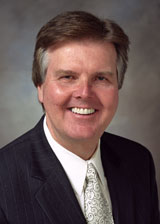Out of the Box
Is it time for Texas to have a full-time Legislature?

Despite the various slowdowns and mad rushes in the Texas House this session, the Legislature managed to pass a number of key bills that will benefit Texans. But the fact that the system almost crashed, and the likelihood it will only get worse in the future, means that we must take a serious look at how our legislative process can be improved to meet the people’s needs in sessions to come.
Here’s the reality: By 2040, the state’s population will double to nearly 50 million. Our budget will likely be well over $500 billion. We’ll need hundreds of miles of new roads, 40,000 or more new teachers, more nurses, more schools, more hospitals.
In legislative time, under the system of meeting every two years, 2040 is only 15 sessions away. Since both chambers spend only about two months of every session actually voting on bills, this means that we have about 30 actual months to solve the problems, and take advantage of the opportunities, of what will likely be the state with the nation’s largest population, economy and budget.
Consider a few other data points. This session’s Legislative Council—a group of 50 state-employed lawyers who write all the legislation, amendments and resolutions—logged 100,000 hours of overtime. The workload increased in some areas by more than 150 percent over just the 2005 session. The council did an outstanding job, but this insane workload created errors that gave some House members the chance to kill important legislation based on minor mistakes.
We cannot continue to operate as we have, with 140-day sessions every other year, and serve the best interests of the people. The jobs of legislators will only grow more difficult as our population grows. Already, each state Senate district is larger than a congressional district in Texas. By 2040, each House member will have nearly 250,000 constituents.
What should we do? I have several ideas. The most controversial: Make legislating a full-time job. This is not just a matter of making the House and Senate work more smoothly. Today, the people who can afford to serve are mostly lawyers and wealthy businesspeople. There is nothing wrong with these folks, but we do not have a true cross-section of the people. The average person cannot work for $600 a month and take six months off every other year from their job. I believe Texas would be better served if more citizens could run and hold office. Full-time members would need to be paid a reasonable salary, but in a state our size, that would be a small cost to do the job as it needs to be done.
I know this: When constituents call or ask to meet with me, they expect me to be in my office. They don’t want to hear that I work part-time. The truth is that many of us work full-time now, serving our districts. But not everyone can do that.
Short of a full-time Legislature, we could also consider meeting 90 days every year, so we can address issues in a more timely manner. We could spend one session only on the budget and emergency items that need action. The following year, we could focus on all other issues, along with emergency items relating to the budget.
The rules of each chamber also must be reformed, beginning with a cap on the number of bills each member can file. (Lawmakers filed more than 6,000 bills in 2005, and nearly 7,500 in 2009, though about the same number passed and ended up on the governor’s desk.) Next, the House must find a way to retool its rules so that no one person, or small group, can sabotage an entire session. (This is a tricky matter, since members must retain the right to stop a bill they feel is bad for their districts or for the state.) The House should also eliminate “ghost voting,” where a member can cast a vote by proxy when she or he is not on the floor.
The Senate should also look at internal reform. The fact that we are a body of only 31 members gives us an inherent advantage: We are forced to work together. It is rare that a senator kills a bill on a point of order, or because of a personal issue with another member—something that is, unfortunately, not so rare in the House. Still, most of us serve on five or six committees, which often meet at the same time. We cannot possibly be in every committee meeting to hear the testimony or debate on every bill. We run back and forth to cast votes on bills on which only our staff are fully up to speed.
I always feel bad when a citizen comes to testify on an issue, and only one or two members of a seven- or nine-person committee are present. Sometimes these citizens have shown up at 8 a.m. and waited 12 or more hours to speak their piece. Often, members have to leave in the middle of their testimony. I usually try to explain that there is nothing to be done, because I have to vote in another committee or lay out a bill. But I always feel rude doing so. I wonder if the people ask themselves whether this is the best way to run our government.
Ultimately, here is the question Texans must ponder: Do they feel their Legislature is doing the will of the people now? Can a state of 25 to 50 million people operate with a part-time team of leaders who show up every other year to vote on a budget of several hundred billion dollars and legislation that affects the lives of every Texan?
The answer is clearly no. This session, I filed a bill that would have simply formed a bipartisan committee of legislators and citizens to study how best the Legislature should prepare for 2040. The bill didn’t make it to the Senate floor, because certain committee members were afraid to even discuss the possibility of change.
I do not suggest that my ideas are the only ones, or even the right ones. We need discussion and debate. But one thing is clear: We cannot continue the way we now operate and serve the future needs of Texans in the manner that they demand and deserve. We must look forward and make sure that our Legislature is ready for the next exciting chapter in Texas history.
Dan Patrick, R-Houston, has served in the Texas Senate since 2007. He asks that readers send their thoughts and ideas about legislative reform to his Facebook page.


